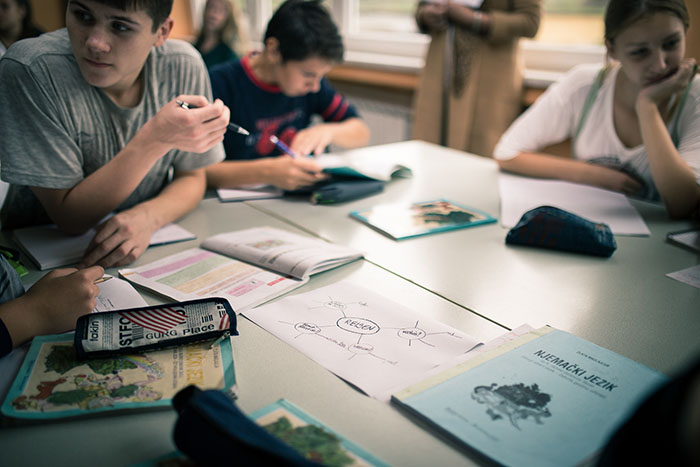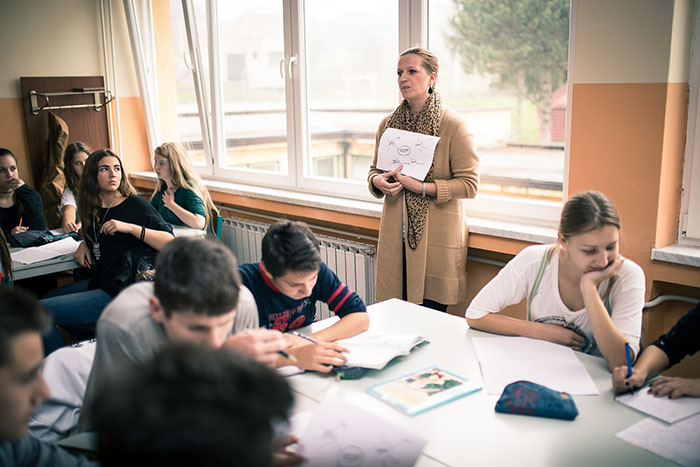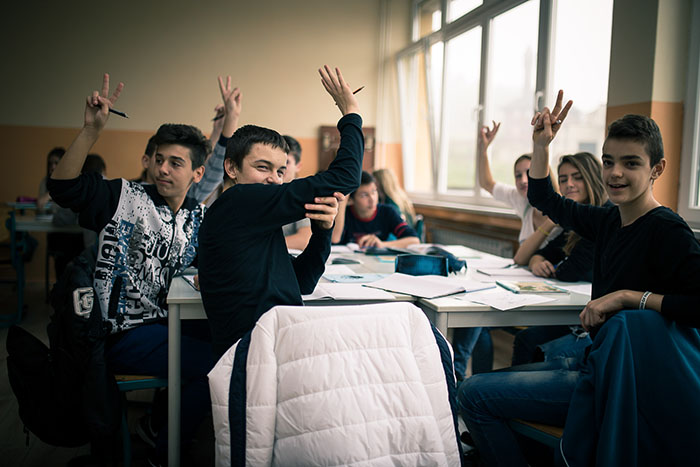 North West Balkans
North West Balkans
Languages
Primary school Mramor: Excellent results require just the willingness and a bit of tailwind

Students who are happy to go to school, lessons given new meaning by the introduction of modern technological devices, interaction as a model for adopting new knowledge, school as the center of events in the local community...
Sounds like a story happening somewhere else, but it is actually the Primary School Mramor near Tuzla.
The small town Mramor, best known for its lignite mine and more than 50 years of mining tradition, has even more reasons to be proud since recently. The school in Mramor is one of the educational institutions in Tuzla Canton that applies the Index for Inclusion methodology in its work. This results in the well-being of students, teachers, parents/guardians and the overall local community.
Our visit to this school was organized on a November day and we were welcomed by music. ''In front of Senka's House'', a gentle folk song, is part of the repertoire of the newly established school orchestra and will be performed on the Statehood Day event. The students only recently obtained a set of instruments that allows them the joy of making music. This is one of the first rehearsals of the orchestra.
The new set of instruments is just one of the novelties that came to this school thanks to the participation in the project ''Inclusive Schools in Inclusive Communities'', which was implemented by the organization Save the Children, in cooperation with the Ministry of Education, Science, Culture and Sports of Tuzla Canton and the Institute of Pedagogy.
Inclusion is a wide concept that implies change and participation in the learning of all children and youth, whereas the Index for Inclusion is a methodology applied at schools for the purpose of reducing barriers in learning in line with inclusion values and establishing cooperation between education authorities, teachers, parents/guardians, students and local communities.
The education for all approach and the participation of the overall community in these processes – sounds like a remote goal. However, we see in the example of Mramor municipality that the achievement of this goal requires a lot of good will and a bit of tailwind.

The integrated ''School for Every Child'' principle is applied at the school, which entails an environment in which all children learn, live and work in an inclusive environment, promote tolerance, accept the other and the different, and have equal opportunities. Students' Council and Parents' Council are important bodies that take part in decision making that impacts the allocation of funds from the grant provided by the Save the Children organization. In addition to the purchase of musical instruments, one of important decisions was also to equip the multi-media classroom, which is one of the most active spaces in the school today.
''At our school, there is an Inclusion Development team, which, in addition to school personnel, also includes the representatives of Students' Council and Parents' Council. Together with the Save the Children organization, we organized a series of seminars related to the Index of Inclusion, in cooperation with the Institute of Pedagogy in Tuzla. We are a school that belongs to Tuzla municipality, and we exist between three municipalities, quite far away from the center. At the same time, in geographical terms, we are the most widely spread school with our local departments. It was thus very important to establish cooperation with parents and the local community, especially when it comes to pre-school education, which is obligatory as of last year. It was important to raise awareness about the necessity for all children from these areas to attend pre-school classes, and thanks to the organization Save the Children, we have adapted the classrooms for the youngest ones'', says Jasmin Karahmet, the Principal of the Primary School Mramor.
After this little success story, the principal continues: ''One of the most important projects was equipping the multi-media classroom. The school used to have very few teaching aids and tools, and such a classroom met the needs of everyone. It is available both to homeroom and subject teachers, and even to the local community for certain activities. There is also a smart board in the classroom connected to the internet and with a touch panel. We managed to purchase software for laboratory work in physics and chemistry used on the board, and it can also be used for displaying other educational content.''
We wanted to know how the introduction of new technology impacted the teaching methodology and the teaching preparation process.
''Such a classroom also requires a new way of preparing for class and much more time, but teachers use it a lot. The lessons have become interactive, and students have shown a much higher interest in such work. Our motto at the school is that we as teachers have to adapt to our students, and with this it turned out to be true. We entered the sphere of interest of our students. Inclusive lessons, projects, service-oriented learning – all the methods that put students first, by which they acquire knowledge and achieve better results, have become our primary choice'', says the Principal.
It is interesting that every year at this school they select a focus area for supplementary lessons held during winter or summer holidays, especially with students having lower achievements. The multi-media classroom makes it possible to introduce fun quizzes in this kind of work, which are filmed and the winners receive a prize – an excellent grade in these subjects.
''This year the focus will be on foreign languages, since our school is far away from the city center and it is therefore more difficult for parents and students to attend special courses. We will thus organize supplementary foreign language classes during the winter holiday for all interested students, which will also be available to other members of the local community. During the winter holiday, we will also organize workshops for the preparation for external matura'', says the Principal Karahmet.
The example of this school shows the importance of cooperation between different stakeholders in the education process. And this exactly is the core of the inclusion concept, which implies a higher participation of all sides in the education process.
The Principal outlines that the cooperation between the school’s Students' Council, Parents' Council and Development Team influences the preparation of the School Development Plan. The partnership with students' parents, students and local associations have once again placed the school building in the center of events and made the school in Mramor recognizable among other primary schools in Tuzla Canton.

In the end, let us also say that the project ''Inclusive Schools in Inclusive Communities'' was implemented in all 85 primary schools in Tuzla Canton over the past two years, namely in municipalities Banovići, Doboj-Istok, Gradačac, Gračanica, Kladanj, Kalesija, Čelić, Lukavac, Srebrenik, Teočak, Sapna, Živinice and the City of Tuzla.
Each of the 85 educational institutions has successfully developed its own projects that contribute to a greater and better inclusion of all children and the wider community in the education process, and the organization Save the Children, Ministry of Education, Science, Culture and Sports and Institute of Pedagogy of Tuzla Canton have provided their support.
We can therefore say that each of these 85 schools can share its own success story – because the children deserve it.